Overview
The article titled "10 Corporate Mission Statement Examples to Inspire Your Brand" addresses a common challenge faced by many brands: the struggle to create mission statements that truly resonate with their audience. This problem can lead to a disconnect between a brand and its customers, ultimately affecting loyalty and trust.
Companies like Tesla, Patagonia, and Nike serve as shining examples of how a well-defined mission can forge deep emotional connections with consumers. Their missions not only articulate their values but also invite customers to be part of a shared journey. This fosters trust and engagement, as customers feel aligned with the brand's purpose.
As we explore these examples, consider how your brand's mission can be a powerful tool for connection. By crafting a mission statement that reflects your core values, you can inspire loyalty and create a community around your brand. Remember, it's not just about what you do; it's about why you do it.
Let's embark on this journey together, finding ways to articulate your brand's unique story and values.
Introduction
In a world where brand loyalty feels increasingly out of reach, many companies find themselves grappling with the challenge of connecting with consumers on a meaningful level. Corporate mission statements emerge as guiding stars, illuminating a brand's purpose and values. These statements not only serve to inspire employees but also resonate deeply with customers, creating a sense of belonging. Yet, as businesses navigate the complexities of modern branding, the task of crafting mission statements that reflect core principles while fostering genuine engagement can be daunting.
How can brands learn from the most effective mission statements? What insights can these examples offer to fuel their journey toward deeper connections with their audience? Together, we can explore these questions and discover ways to nurture meaningful engagement.
RNO1: Creating Radical Digital Experiences for Modern Brands
In today's fast-paced digital world, many companies find themselves overwhelmed by the complexities of branding and user experience. This can lead to feelings of uncertainty and frustration, especially for tech startup founders who are eager to make their mark. It's essential to recognize that trust plays a vital role in consumer choices—after all, 90% of shoppers prioritize it when deciding where to spend their money. Additionally, companies that focus on digital engagement can enjoy a 30% increase in consumer loyalty, highlighting the growing importance of meaningful digital interactions.
At RNO1, we understand these challenges and are dedicated to creating radical digital experiences that empower contemporary companies. By focusing on comprehensive branding, user experience (UX), and digital product design, we help businesses navigate the digital landscape with confidence. Our innovative subscription models—Revolve, Retrn, and Ryde—provide ongoing support and expertise, ensuring sustainable growth and differentiation in competitive markets.
As a leader in branding and digital design, RNO1 stands as a compassionate ally for purpose-driven companies striving to thrive in the digital age. With our design-focused approach and results-driven mindset, we are committed to delivering measurable success through collaborative strategies. It's projected that digital branding efforts will account for 60% of global marketing budgets by 2024, and we want to ensure that you are part of this transformative journey.
We also emphasize core principles such as strategy activation and market adoption, which are crucial for driving brand growth and engagement. By working together, we can turn your vision into reality and foster a supportive community that celebrates your achievements in the digital realm. Remember, you are not alone on this journey; RNO1 is here to guide you every step of the way.
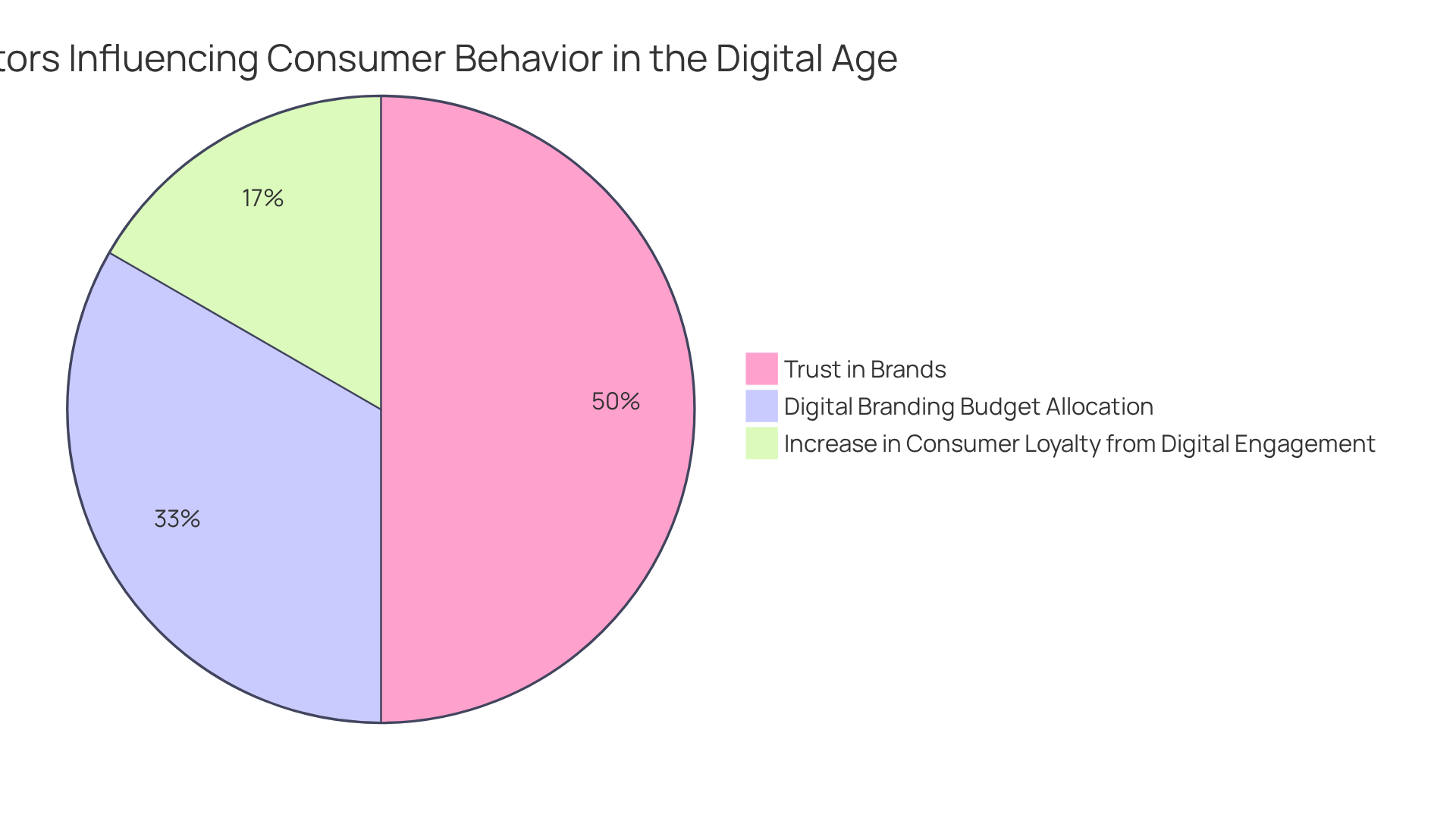
Tesla: Accelerating the World's Transition to Sustainable Energy
Tesla's mission is to accelerate the world's transition to sustainable energy. This statement reflects not only the company's commitment to environmental responsibility but also its role as a leader in the electric vehicle market. In a world where many are increasingly aware of their impact on the planet, Tesla inspires individuals and companies to consider the consequences of their choices.
It's concerning to note that studies show:
- 76% of shoppers would stop buying from companies that ignore ecological practices.
- 88% of individuals demonstrate a stronger commitment to businesses that support social or environmental causes.
This highlights how a strong focus on sustainability can nurture brand loyalty and set a company apart in the marketplace.
Recent initiatives, such as advancements in solar technology and energy storage solutions, further reinforce Tesla's dedication to sustainable energy. As the company continues to lead in this area, its guiding principle serves as a beacon for others, illustrating how a clear commitment to sustainability can foster engagement and loyalty among environmentally conscious individuals.
Moreover, with 53% of global consumers citing poor quality or availability of ESG data as significant barriers to sustainable investing, Tesla's transparency in its sustainability efforts becomes even more vital. By sharing its journey and encouraging others to join in, Tesla not only addresses a pressing issue but also creates a community of like-minded individuals striving for a better future.
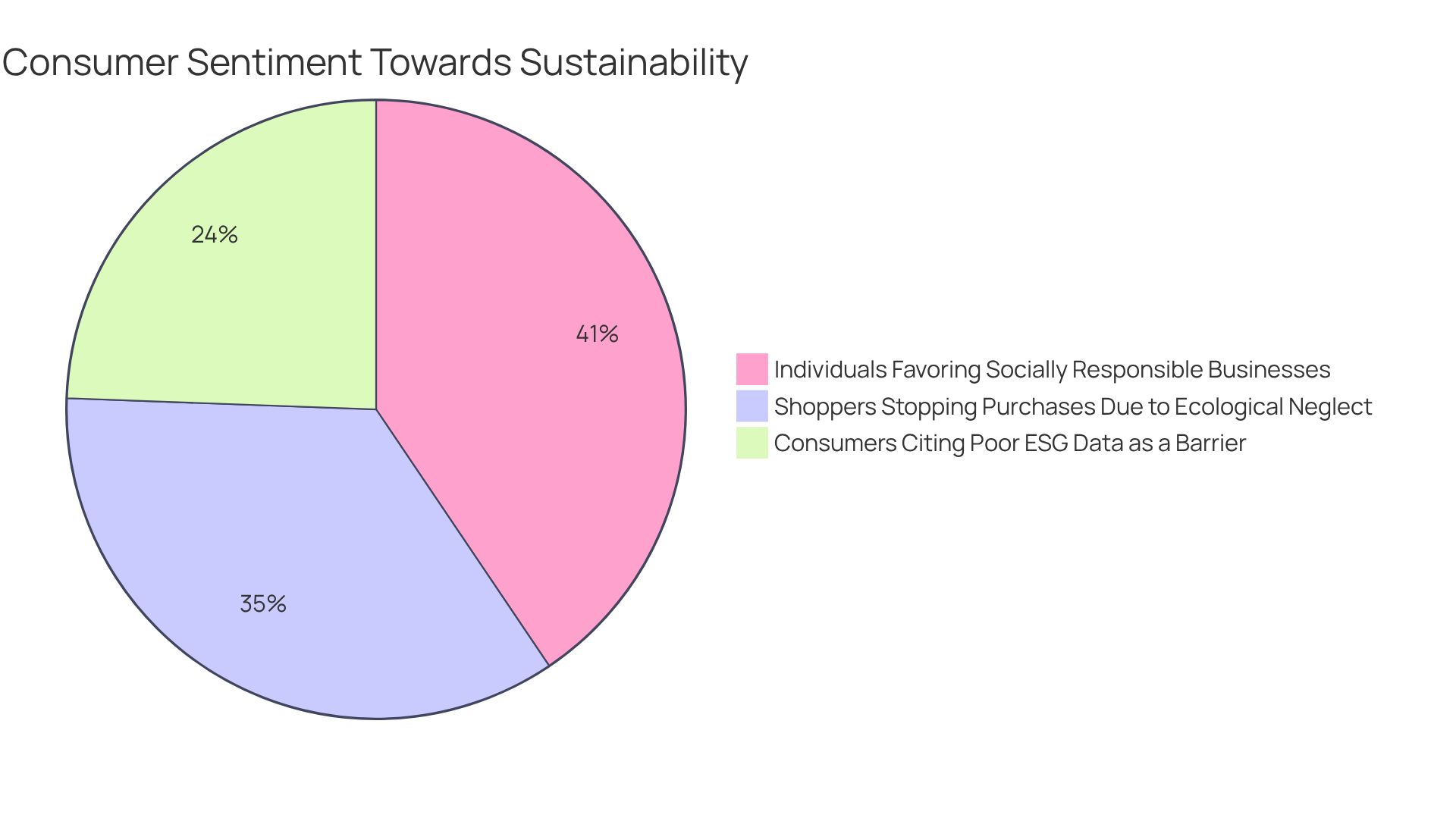
Patagonia: Business to Save Our Home Planet
Patagonia's mission to protect our home planet speaks to a pressing issue we all face: the environmental challenges that threaten our world. This is not just a slogan; it is intricately woven into every aspect of the company’s operations, influencing product design and supply chain management. By prioritizing transparency and ethical sourcing, Patagonia resonates with a growing community of environmentally conscious consumers.
In fact, 80% of individuals are willing to spend more on sustainably produced items, reflecting a deep-seated desire for responsible choices. This alignment with customer values fosters trust and loyalty, as shown by the 81% of global respondents who believe companies should actively contribute to environmental enhancement.
Gabriele Limonta highlights that 78% of buyers prefer brands that display eco-labels, further reinforcing Patagonia's approach. Additionally, with 73% of Millennials placing a high value on sustainability in their purchasing decisions, Patagonia's initiatives, like the 'Worn Wear' program, set a powerful example of corporate accountability.
This illustrates how a meaningful purpose can deeply connect with consumers, nurturing lasting commitment and inspiring us all to make a difference together.

Starbucks: Inspiring and Nurturing the Human Spirit
Starbucks' goal is to inspire and nurture the human spirit—one person, one cup, and one neighborhood at a time. This mission reflects the company’s deep commitment to creating a welcoming environment for both customers and employees. In a world where connection often feels fleeting, Starbucks focuses on community, fostering a sense of belonging that resonates with its loyal customer base. They value the experience as much as the product, and this objective serves as a guiding principle for their operations. It beautifully illustrates how corporate mission statement examples can enhance customer commitment and identity.
Consider the implications: data shows that 73% of customers would recommend a restaurant with a robust rewards program, highlighting the importance of community-oriented initiatives in enhancing reputation. Engaged customers are 54% more likely to remain loyal, underscoring the vital role that connection plays in cultivating lasting relationships. Moreover, clients participating in a rewards program tend to spend 12-18% more annually, revealing the financial benefits of investing in community initiatives. Starbucks exemplifies how a commitment to community can transform customer loyalty into a powerful asset, which is reflected in several corporate mission statement examples.
As Brian Niccol, Chairman and CEO, wisely states, "If we keep it very straightforward - coffee, people and humanity - we’re going to be in really good shape." This perspective reinforces the brand's focus on nurturing relationships within the community, reminding us that at the heart of every successful business lies a commitment to human connection.

Nike: Bringing Inspiration and Innovation to Every Athlete
Nike's mission statement, 'to bring inspiration and innovation to every athlete in the world,' highlights a significant challenge in branding: the need for inclusivity. By defining an athlete as anyone with a body, Nike opens its arms to a diverse audience, ensuring that its message resonates with many. This focus on inspiration and innovation not only positions Nike as a leader in the sports sector but also encourages individuals to reach for their dreams and push their limits.
The emotional bond fostered by this mission is profound; companies that evoke strong feelings can see a remarkable 96% increase in conversion rates. Furthermore, 82% of customers choose to buy from brands they feel a strong emotional connection with, underlining the importance of emotional engagement in building customer loyalty. Those who connect emotionally with a brand also showcase three times greater lifetime value, revealing the lasting benefits of Nike's heartfelt marketing approach.
Nike's commitment to inclusivity and empowerment illustrates how a well-defined purpose can inspire product innovation and enhance customer loyalty, ultimately fortifying the brand's position in a competitive landscape. Together, we can learn from Nike's example and embrace the power of emotional connection in our own journeys.

Google: Organizing the World's Information for Universal Access
In today's world, the challenge of accessing information can feel overwhelming for many individuals. Google's mission to organize the world's information and make it universally accessible and useful addresses this crucial problem. This commitment not only reflects a deep dedication to providing valuable resources but also positions Google as a trusted source of information across the globe. By prioritizing accessibility, Google fosters user engagement and commitment, illustrating how a tech company's purpose can resonate with a diverse audience.
As we look ahead to 2025, the emphasis on accessibility is expected to further strengthen brand loyalty, particularly as individuals increasingly gravitate toward businesses that prioritize inclusivity. Research shows that organizations embedding accessibility into their design and strategy are more likely to attract and retain users, ultimately enhancing customer satisfaction and trust. It’s encouraging to note that 81% of adults without disabilities feel confident owning and using a digital device, which underscores the vital role accessibility plays in nurturing user confidence.
Moreover, with 1.3 billion individuals, or 16% of the global population, facing significant disabilities, Google's purpose reaches a vast audience, highlighting the importance of inclusivity in our digital age. Additionally, a striking 51% of consumers express a willingness to pay more for products or services from businesses that prioritize web accessibility, showcasing the financial advantages of such an approach.
As the digital landscape continues to evolve, Google's purpose serves as a powerful reminder of the importance of aligning corporate objectives with user needs. It reinforces the idea that a well-defined purpose statement can significantly impact a brand's reputation and success. Together, we can embrace this journey toward greater accessibility and inclusivity, ensuring that everyone has the opportunity to engage with the wealth of information available to them.
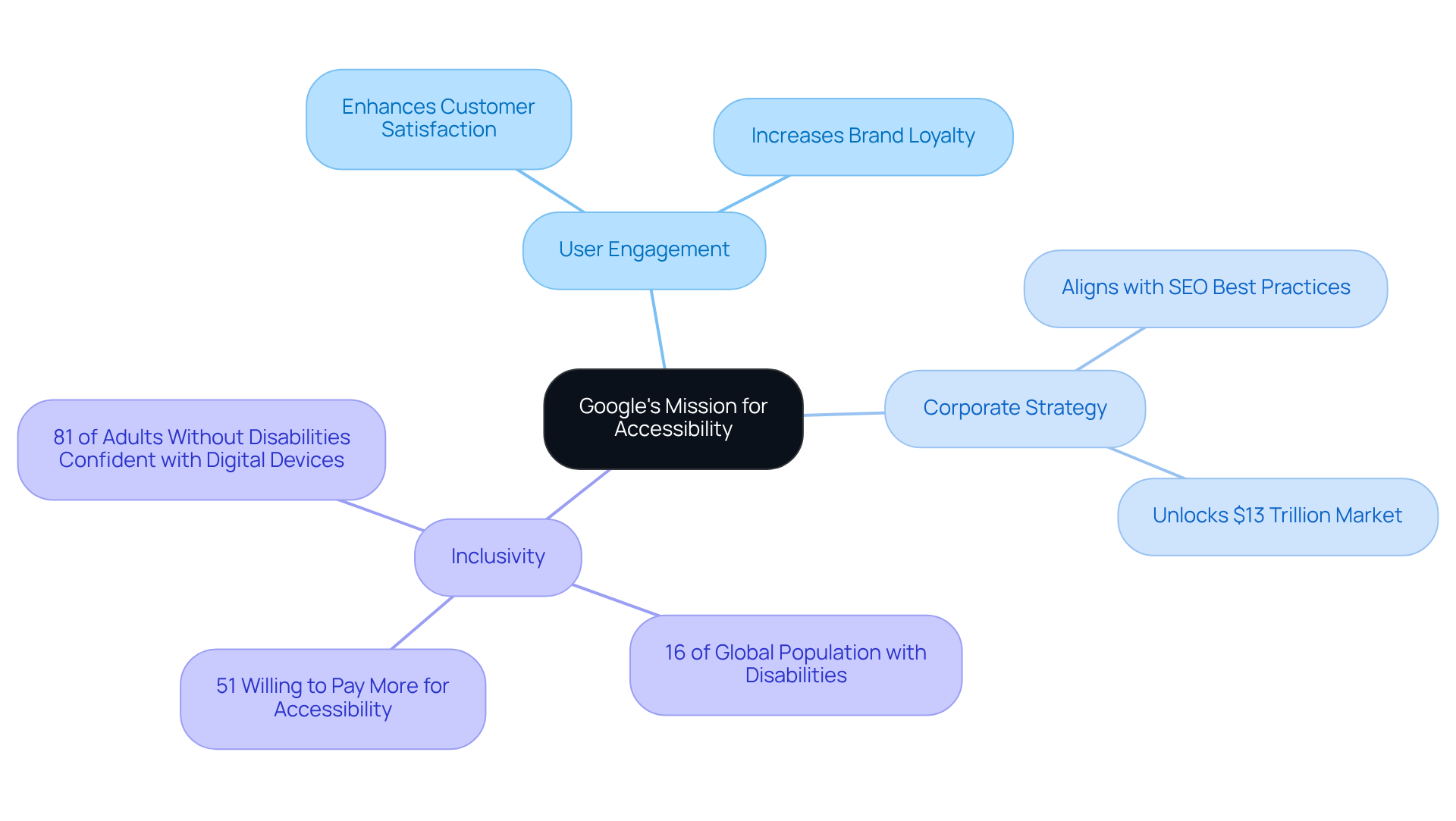
Disney: Entertaining, Informing, and Inspiring Through Storytelling
Disney's mission is to entertain, inform, and inspire people globally through the power of unparalleled storytelling. In a world where many brands struggle to connect, Disney’s commitment reflects a deep dedication to creating magical experiences for audiences of all ages. This approach highlights the effectiveness of narrative-driven branding, which can often feel like a lifeline for tech startup founders navigating a crowded market.
By emphasizing storytelling, Disney cultivates emotional connections that significantly improve customer commitment. Research shows that companies employing engaging narratives can experience a 55% rise in customer loyalty. Stories resonate profoundly with individuals, fostering a stronger bond with the company. Furthermore, 92% of shoppers favor companies that produce advertisements resembling stories, underscoring the significance of narrative in contemporary marketing. Additionally, 68% of consumers indicate that narratives affect their purchasing choices, illustrating the direct impact of storytelling on consumer behavior.
Disney's approach serves as a beacon, demonstrating how a compelling narrative can enhance identity and boost customer involvement. This serves as a significant example among corporate mission statement examples for other companies seeking to foster enduring connections with their audiences.
As Amra Beganovich aptly states, 'In a world flooded with ads, data, and noise, the entities that stand out aren’t the ones shouting the loudest—they’re the ones telling the best stories.'
For tech startup founders, integrating storytelling into branding strategies can enhance emotional connections and lead to a 44% higher ROI compared to rational content. This makes storytelling not just a creative choice but a crucial element for success, nurturing the potential for meaningful engagement with customers.
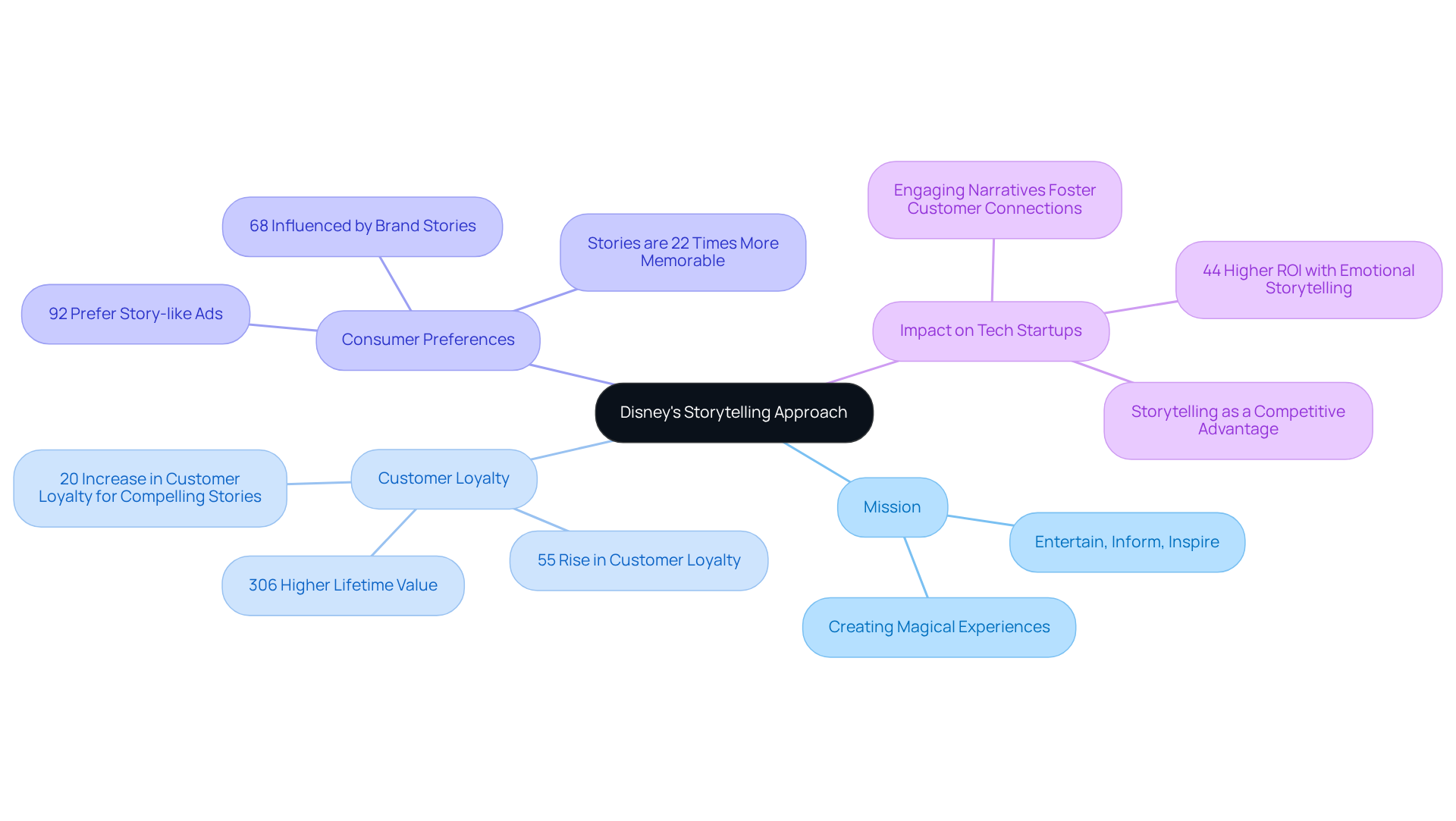
LinkedIn: Creating Economic Opportunity for Every Member of the Global Workforce
LinkedIn's aspiration to create economic opportunity for every member of the global workforce speaks volumes about its dedication to nurturing professional development and fostering meaningful connections. In a world where job seekers often feel lost and employers struggle to find the right talent, LinkedIn stands as a beacon of inclusivity and empowerment. This commitment not only positions LinkedIn as an essential resource but also cultivates a supportive community among its users. By prioritizing economic opportunity, LinkedIn encourages individuals to connect, share their journeys, and grow together in an environment that feels welcoming and affirming.
Consider the fact that 93% of B2B marketers turn to LinkedIn for thought leadership content. This statistic highlights the platform's effectiveness in nurturing professional growth. Moreover, companies that maintain active LinkedIn pages experience five times more page views, underscoring the importance of engaging with this vibrant community. Such efforts exemplify how corporate mission statement examples can be thoughtfully crafted to resonate deeply, fostering both individual success and collective advancement in the professional landscape.
As B2B marketers have noted, 'LinkedIn has twice the conversion rates of other channels.' This insight reinforces the significance of LinkedIn's mission to create economic opportunities, reminding us that in this interconnected world, we have the power to uplift one another. Together, we can navigate the challenges of the professional realm, finding strength in our shared experiences and aspirations.
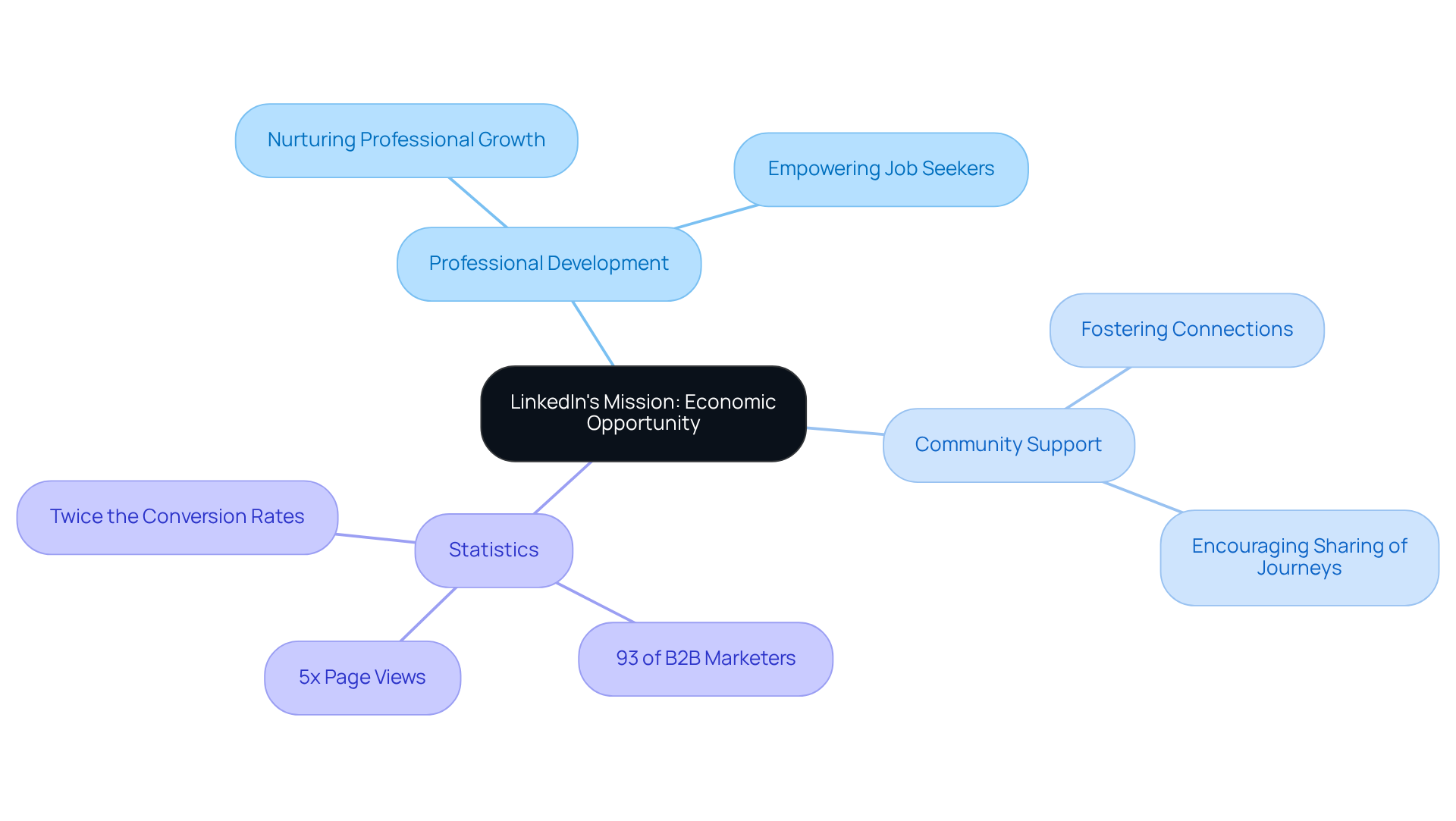
American Express: Essential Products and Services for Customer Aspirations
American Express' purpose centers on the vital role it plays in supporting its customers and their communities during challenging times, empowering them to thrive. This commitment is reflected in the essential products and services tailored to meet a wide array of customer needs. By placing customer aspirations at the forefront, American Express has built a strong reputation for exceptional service and steadfast support. This mission exemplifies how a financial services company can enhance commitment and trust through a dedicated, customer-focused strategy, ultimately serving as one of the corporate mission statement examples that nurture long-term success.
Similarly, RNO1 stands ready to empower purpose-driven companies through strategic activation and identity design, ensuring they meet the ever-evolving needs of their customers. By focusing on measurable outcomes and collaborative approaches, RNO1 aligns with the principles that foster brand commitment and trust, much like American Express. Together, they illustrate a path forward that not only addresses immediate challenges but also cultivates lasting relationships.
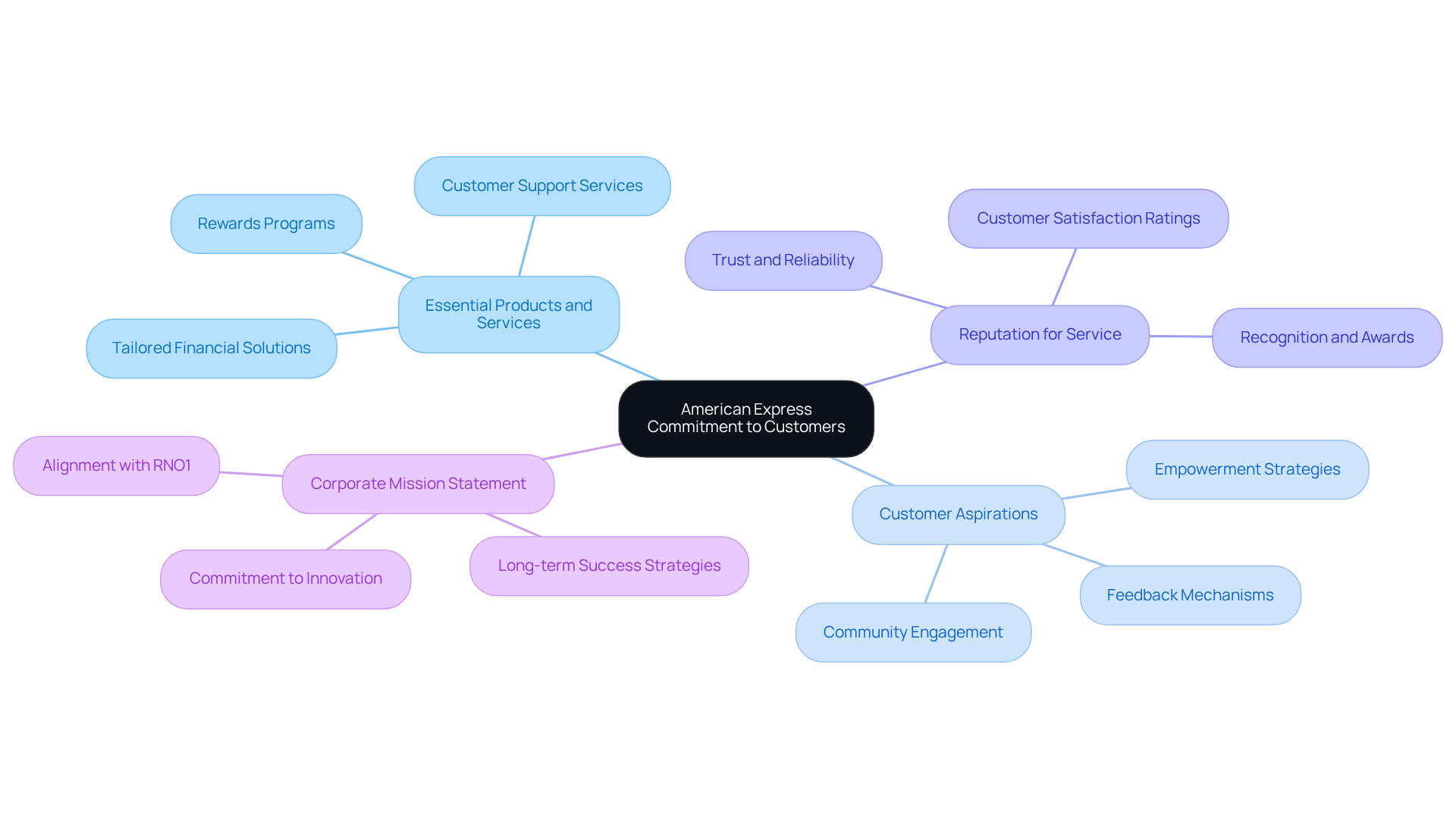
IKEA: Offering Well-Designed, Functional Products at Affordable Prices
In today's world, many people struggle to find home furnishings that are both stylish and affordable. This challenge can lead to frustration, as individuals seek to create comfortable living spaces without breaking the bank. IKEA understands this pain point and is committed to addressing it through its mission of providing a diverse range of well-designed, functional home furnishings at prices that everyone can afford. By prioritizing accessibility and affordability, IKEA has become a beloved leader in the home furnishing market, connecting with a wide audience who values these principles.
The focus on functional design not only enhances customer satisfaction but also fosters a sense of loyalty among consumers. Many have shared their experiences of finding beautiful, budget-friendly options that transform their homes, proving that IKEA's approach resonates deeply. As we look ahead to 2025, it's clear that the impact of IKEA's mission on customer satisfaction remains significant. This reinforces the idea that corporate mission statement examples can cultivate brand attachment and enrich the overall shopping experience.
Moreover, IKEA's low-cost strategy, bolstered by economies of scale, enables the company to offer competitive pricing while maintaining quality. This commitment to affordability, combined with a dedication to sustainability, strengthens customer loyalty and aligns with the growing demand for environmentally responsible products. By choosing IKEA, customers not only find stylish solutions for their homes but also support a brand that cares about their needs and the planet.
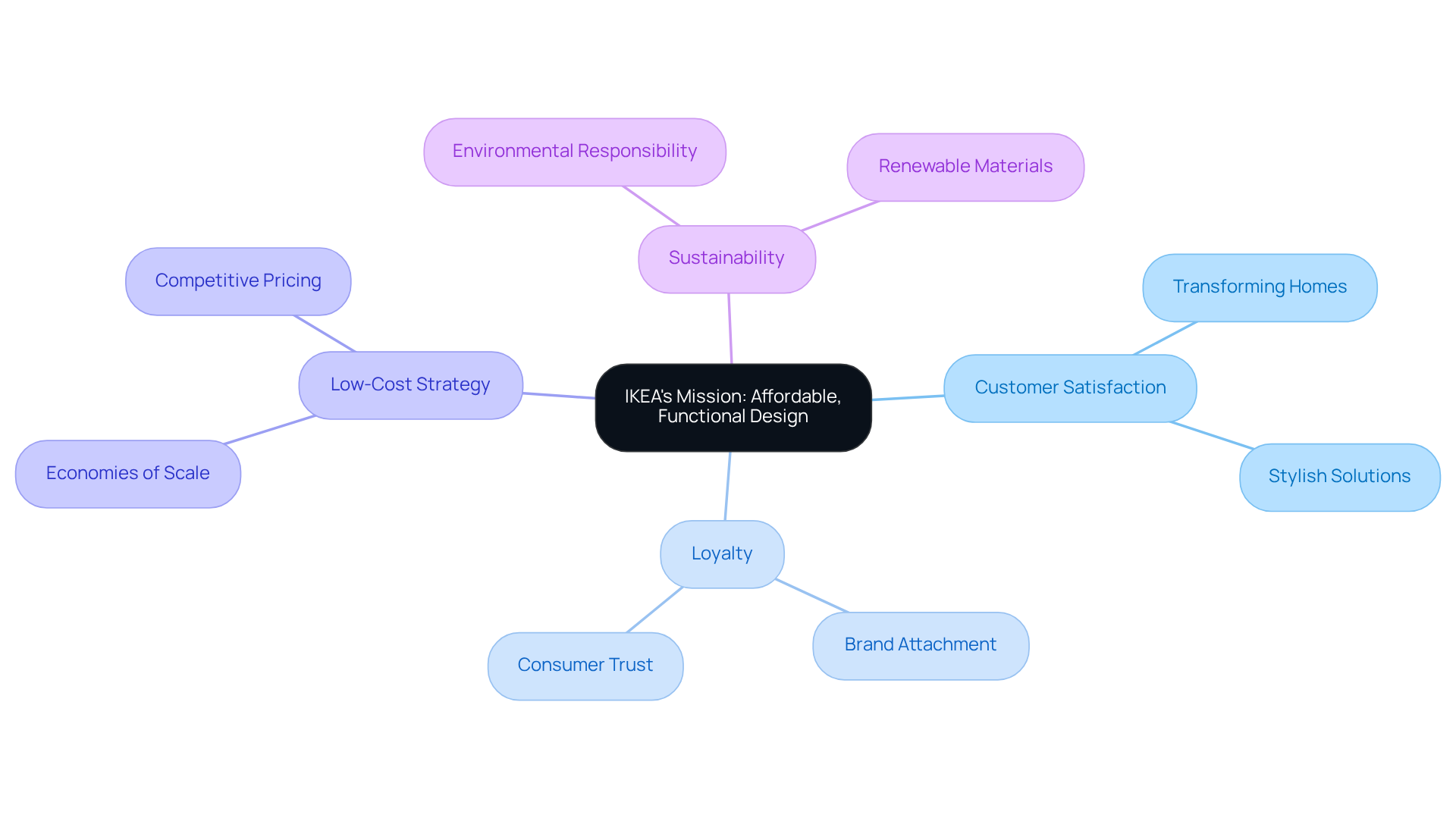
Conclusion
In today’s competitive landscape, many brands face the challenge of truly connecting with their consumers. This disconnect can lead to diminished loyalty and engagement, leaving companies feeling lost in the noise. However, embracing a well-defined corporate mission statement can be a powerful solution. It allows brands to align their values with customer expectations, fostering a sense of loyalty and driving success.
Consider the inspiring examples of:
- RNO1
- Tesla
- Patagonia
- Starbucks
Each of these brands demonstrates how a clear purpose resonates with consumers, guiding strategic decisions and enhancing customer engagement. By prioritizing social and environmental values, they cultivate trust and satisfaction, paving the way for long-term success.
As brands navigate the ever-evolving marketplace, crafting a compelling corporate mission statement becomes essential. It serves as a foundation for building meaningful relationships with consumers. Reflecting on these examples can inspire businesses to create mission statements that not only define their purpose but also engage their audience. By doing so, they can drive themselves toward a brighter future, filled with connection and impact. Let us embrace this journey together, supporting one another in the pursuit of meaningful missions that resonate deeply with those we serve.
Frequently Asked Questions
What is the primary focus of RNO1?
RNO1 focuses on creating radical digital experiences for modern brands by emphasizing comprehensive branding, user experience (UX), and digital product design.
How does trust influence consumer choices according to the article?
Trust plays a vital role in consumer choices, with 90% of shoppers prioritizing it when deciding where to spend their money.
What benefits do companies gain from focusing on digital engagement?
Companies that focus on digital engagement can enjoy a 30% increase in consumer loyalty.
What innovative subscription models does RNO1 offer?
RNO1 offers three subscription models: Revolve, Retrn, and Ryde, which provide ongoing support and expertise for businesses.
What role does sustainability play in Tesla's mission?
Tesla's mission is to accelerate the world's transition to sustainable energy, reflecting its commitment to environmental responsibility and leadership in the electric vehicle market.
How do consumers react to companies that ignore ecological practices?
Studies show that 76% of shoppers would stop buying from companies that ignore ecological practices.
What recent initiatives has Tesla undertaken to support sustainable energy?
Tesla has made advancements in solar technology and energy storage solutions to reinforce its dedication to sustainable energy.
How does Patagonia integrate its mission into its operations?
Patagonia's mission to protect the planet influences every aspect of its operations, including product design and supply chain management, with a focus on transparency and ethical sourcing.
What percentage of individuals are willing to spend more on sustainably produced items?
80% of individuals are willing to spend more on sustainably produced items.
What initiatives does Patagonia have to promote sustainability?
Patagonia has initiatives like the 'Worn Wear' program, which exemplifies corporate accountability and encourages sustainable practices among consumers.




